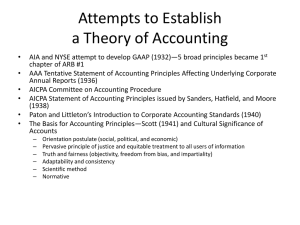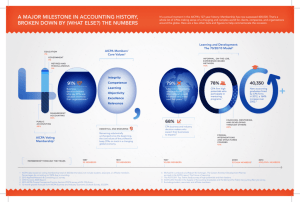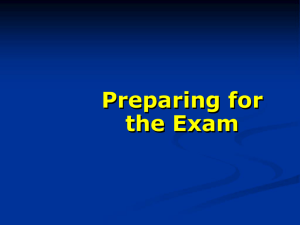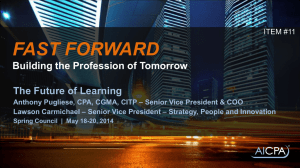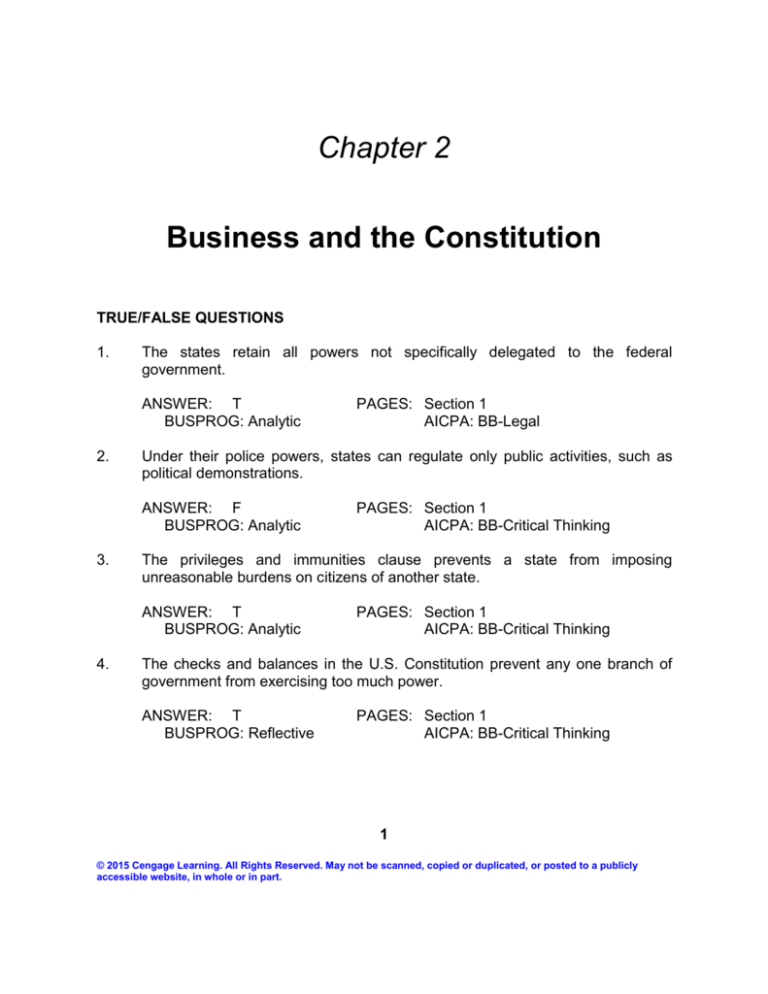
Chapter 2
Business and the Constitution
TRUE/FALSE QUESTIONS
1.
The states retain all powers not specifically delegated to the federal
government.
ANSWER: T
BUSPROG: Analytic
2.
Under their police powers, states can regulate only public activities, such as
political demonstrations.
ANSWER: F
BUSPROG: Analytic
3.
PAGES: Section 1
AICPA: BB-Critical Thinking
The privileges and immunities clause prevents a state from imposing
unreasonable burdens on citizens of another state.
ANSWER: T
BUSPROG: Analytic
4.
PAGES: Section 1
AICPA: BB-Legal
PAGES: Section 1
AICPA: BB-Critical Thinking
The checks and balances in the U.S. Constitution prevent any one branch of
government from exercising too much power.
ANSWER: T
BUSPROG: Reflective
PAGES: Section 1
AICPA: BB-Critical Thinking
1
© 2015 Cengage Learning. All Rights Reserved. May not be scanned, copied or duplicated, or posted to a publicly
accessible website, in whole or in part.
2
TEST BANK—UNIT ONE: THE LEGAL ENVIRONMENT OF BUSINESS
5.
The national government can regulate almost every commercial enterprise in
the United States.
ANSWER: T
BUSPROG: Analytic
6.
The Constitution expressly delegated to the states the power to regulate
interstate commerce.
ANSWER: F
BUSPROG: Analytic
7.
PAGES: Section 1
AICPA: BB-Legal
Some constitutional protections apply to business entities.
ANSWER: T
BUSPROG: Analytic
11.
PAGES: Section 1
AICPA: BB-Critical Thinking
If a tax measure is reasonable, it is generally held to be within the national
taxing power.
ANSWER: T
BUSPROG: Analytic
10.
PAGES: Section 1
AICPA: BB-Legal
Whether the federal government has preempted a certain subject area against
state regulation is always clear.
ANSWER: F
BUSPROG: Analytic
9.
PAGES: Section 1
AICPA: BB-Legal
When there is a direct conflict between a federal and a state law, the state law
is rendered invalid.
ANSWER: T
BUSPROG: Analytic
8.
PAGES: Section 1
AICPA: BB-Critical Thinking
PAGES: Section 2
AICPA: BB-Critical Thinking
The First Amendment does not protect symbolic speech.
ANSWER: F
BUSPROG: Analytic
PAGES: Section 2
AICPA: BB-Critical Thinking
© 2015 Cengage Learning. All Rights Reserved. May not be scanned, copied or duplicated, or posted to a publicly
accessible website, in whole or in part.
CHAPTER 2: BUSINESS AND THE CONSTITUTION
12.
The First Amendment protects commercial speech more extensively than
noncommercial speech.
ANSWER: F
BUSPROG: Analytic
13.
PAGES: Section 3
AICPA: BB-Legal
Procedural due process requires that any government decision to take a
person’s property must be made fairly.
ANSWER: T
BUSPROG: Analytic
18.
PAGES: Section 3
AICPA: BB-Critical Thinking
Equal protection means that the government cannot enact laws that treat
similarly situated individuals differently.
ANSWER: T
BUSPROG: Analytic
17.
PAGES: Section 2
AICPA: BB-Critical Thinking
The due process clause applies to “legal persons,” which does not include
corporations.
ANSWER: F
BUSPROG: Analytic
16.
PAGES: Section 2
AICPA: BB-Legal
The establishment clause requires a complete separation of church and state.
ANSWER: F
BUSPROG: Analytic
15.
PAGES: Section 2
AICPA: BB-Critical Thinking
The establishment clause of the U.S. Constitution prohibits the federal
government establishing a state-sponsored religion.
ANSWER: T
BUSPROG: Analytic
14.
3
PAGES: Section 3
AICPA: BB-Legal
A law that discriminates based on gender must substantially relate to an
important government objective to be valid.
ANSWER: T
BUSPROG: Analytic
PAGES: Section 3
AICPA: BB-Legal
© 2015 Cengage Learning. All Rights Reserved. May not be scanned, copied or duplicated, or posted to a publicly
accessible website, in whole or in part.
4
TEST BANK—UNIT ONE: THE LEGAL ENVIRONMENT OF BUSINESS
19.
The U.S. Constitution explicitly mentions a general right to privacy.
ANSWER: F
BUSPROG: Analytic
20.
PAGES: Section 4
AICPA: BB-Critical Thinking
Law enforcement officials can track the phone and e-mail communications of
one party to find out the identity of the other party.
ANSWER: T
BUSPROG: Analytic
PAGES: Section 4
AICPA: BB-Legal
MULTIPLE-CHOICE QUESTIONS
1.
National Hospital Organization (NHO), a political lobbying group, wants a
certain healthcare cost-reimbursement policy enacted into law. If NHO’s policy
conflicts with the U.S. Constitution, a law embodying it can be imposed by
a.
b.
c.
d.
Congress.
a federal court.
the President.
none of the choices.
ANSWER: D
BUSPROG: Reflective
2.
PAGES: Section 1
AICPA: BB-Legal
The Abundant Resources for Energy Association would like a certain law
enacted, administered, interpreted, and enforced in the best interest of its
members, which include coal and oil companies. Under the Constitution,
Congress
a.
b.
c.
d.
administers the laws.
enforces the laws.
interprets the laws.
enacts the laws.
ANSWER: D
BUSPROG: Reflective
PAGES: Section 1
AICPA: BB-Legal
© 2015 Cengage Learning. All Rights Reserved. May not be scanned, copied or duplicated, or posted to a publicly
accessible website, in whole or in part.
CHAPTER 2: BUSINESS AND THE CONSTITUTION
3.
The state of Texas regulates private activities to protect or promote the public
order, health, safety, and general welfare under its
a.
b.
c.
d.
police powers.
taxing powers.
spending powers.
supremacy powers.
ANSWER: A
BUSPROG: Reflective
4.
PAGES: Section 1
AICPA: BB-Legal
Orinoco.com, an online seller of books, CDs, DVDs, games, and a variety of
other consumer entertainment products, files a suit against the state of Nevada,
claiming that a Nevada state law violates the commerce clause. The court will
agree if the statute imposes a substantial burden on
a.
b.
c.
d.
a local government.
interstate commerce.
noneconomic activity.
the state.
ANSWER: B
BUSPROG: Reflective
5.
5
PAGES: Section 1
AICPA: BB-Legal
Brayden, a citizen of California, obtains a federal license to operate a
commercial fishing boat in a certain area off the Northern California coast. The
California state legislature enacts a law that bans all commercial fishing in that
area. The state law most likely violates
a.
b.
c.
d.
no provision in the U.S. Constitution.
the commerce clause.
the due process clause.
the supremacy clause.
ANSWER: D
BUSPROG: Reflective
PAGES: Section 1
AICPA: BB-Critical Thinking
© 2015 Cengage Learning. All Rights Reserved. May not be scanned, copied or duplicated, or posted to a publicly
accessible website, in whole or in part.
6
TEST BANK—UNIT ONE: THE LEGAL ENVIRONMENT OF BUSINESS
6.
Mia, a citizen of North Dakota, has certain rights under an employment contract
with Oil Shale Mining, Inc., and wants to enforce them in the state of South
Dakota. A South Dakota state court is most likely to enforce Mia’s rights under
a.
b.
c.
d.
no provision in the U.S. Constitution.
the commerce clause.
the full faith and credit clause.
the privileges and immunities clause.
ANSWER: C
BUSPROG: Reflective
7.
The U.S. Constitution sets out the authority and the limits of the branches of the
government. The term checks and balances means that
a.
b.
c.
d.
Congress writes checks and the other branches balance the budget.
each branch has some power to limit the actions of the others.
the courts balance their authority against the other branches’ checklists.
the president “checks” the courts, which “balance” the laws.
ANSWER: B
BUSPROG: Analytic
8.
PAGES: Section 1
AICPA: BB-Legal
PAGES: Section 1
AICPA: BB-Legal
Congress enacts a law that sets out a process for the Food and Drug
Administration (FDA) to follow when approving new pharmaceuticals for
consumer use. The law includes a preemption provision. A pharmaceutical that
the FDA approved injures Deanna, a child whose mother Ella files a claim
under state law to recover. The court will most likely rule that
a.
b.
c.
d.
Ella’s state-law claim preempts the federal law.
concurrent claims can be brought under the federal and state laws.
the federal and state laws preempt each other.
the federal law preempts Ella’s state-law claim.
ANSWER: D
BUSPROG: Reflective
PAGES: Section 1
AICPA: BB-Legal
© 2015 Cengage Learning. All Rights Reserved. May not be scanned, copied or duplicated, or posted to a publicly
accessible website, in whole or in part.
CHAPTER 2: BUSINESS AND THE CONSTITUTION
9.
The Rapid Transit Institute wants the federal government to spend money on
inner city and inter-city light rail systems. Congress can spend revenue
a.
b.
c.
d.
only to carry out Congress’s enumerated powers.
to promote any objective that Congress deems worthwhile.
without regard to whether the expenditure violates the Bill of Rights.
without regard to whether the expenditure violates the Constitution.
ANSWER: B
BUSPROG: Reflective
10.
PAGES: Section 1
AICPA: BB-Legal
Ryan, a follower of a certain religion, publishes an article in Secular Sunday
magazine insisting that Congress base all federal law on his religious
principles. The First Amendment guarantees Ryan’s freedom of
a.
b.
c.
d.
religion only.
speech and the press only.
none of the choices.
the press, speech, and religion.
ANSWER: D
BUSPROG: Reflective
11.
7
PAGES: Section 2
AICPA: BB-Legal
Lake City enacts an ordinance that bans the distribution of all printed materials
on city streets. Mackensie opposes the city’s latest “revenue-enhancing”
measure and wants to protest by distributing handbills. In her suit against Lake
City, a court would likely hold the ban on printed materials to be
a.
b.
c.
d.
constitutional under the First Amendment.
not subject to the U.S. Constitution.
unconstitutional under the commerce clause.
unconstitutional under the First Amendment.
ANSWER: D
BUSPROG: Reflective
PAGES: Section 2
AICPA: BB-Critical Thinking
© 2015 Cengage Learning. All Rights Reserved. May not be scanned, copied or duplicated, or posted to a publicly
accessible website, in whole or in part.
8
TEST BANK—UNIT ONE: THE LEGAL ENVIRONMENT OF BUSINESS
12.
The owners of Coach Industries, Inc., a privately owned corporation, regularly
express opinions on political issues through their company. Under the First
Amendment, corporate political speech is
a.
b.
c.
d.
discouraged.
forbidden.
protected.
required.
ANSWER: C
BUSPROG: Reflective
13.
Tennessee enacts a statute that bans advertising that is in “bad taste.” A court
would likely hold that this statute is
a.
b.
c.
d.
an unconstitutional restriction of speech.
constitutional under the First Amendment.
justified by the need to protect individual rights.
necessary to protect state interests.
ANSWER: A
BUSPROG: Reflective
14.
PAGES: Section 2
AICPA: BB-Legal
PAGES: Section 2
AICPA: BB-Critical Thinking
The police obtain a search warrant and search Jordan’s apartment. After yelling
obscenities at the officers, Jordan confesses to a crime and implicates his
friends. The Constitution protects against
a.
b.
c.
d.
obscene speech.
implication of others.
unreasonable searches.
none of the choices.
ANSWER: C
BUSPROG: Reflective
PAGES: Section 2
AICPA: BB-Legal
© 2015 Cengage Learning. All Rights Reserved. May not be scanned, copied or duplicated, or posted to a publicly
accessible website, in whole or in part.
CHAPTER 2: BUSINESS AND THE CONSTITUTION
15.
Vile Periodicals, Inc., disseminates obscene materials. This is a
a.
b.
c
d.
crime under numerous state and federal statutes.
privilege under Article IV, Section 2.
right under the commerce clause.
right under the First Amendment.
ANSWER: A
BUSPROG: Reflective
16.
PAGES: Section 2
AICPA: BB-Legal
Bailey owns and operates Nature’s Corporation, a destination resort in
Colorado that features fresh water fishing, whitewater rafting, and mountain trail
camping. The Constitution provides that no person shall be deprived of “life,
liberty, or property without due process of law.” Included as “legal persons”
under this clause are
a.
b.
c.
d.
the resort equipment and other “human-made creations.”
the corporation.
fish and other “beings in nature.”
none of the choices.
ANSWER: B
BUSPROG: Reflective
17.
9
PAGES: Section 3
AICPA: BB-Legal
Arkansas enacts a statute that limits the liberty of all persons, including
corporations, to broadcast “annoying” radio commercials. This may be a
violation of
a.
b.
c.
d.
equal protection.
procedural due process.
substantive due process.
the right to privacy.
ANSWER: C
BUSPROG: Reflective
PAGES: Section 3
AICPA: BB-Legal
© 2015 Cengage Learning. All Rights Reserved. May not be scanned, copied or duplicated, or posted to a publicly
accessible website, in whole or in part.
10
18.
TEST BANK—UNIT ONE: THE LEGAL ENVIRONMENT OF BUSINESS
Landon claims that a Missouri state statute infringes on his “procedural due
process” rights. This claim focuses on the
a.
b.
c.
d.
procedures used in making decisions to take life, liberty, or property.
content of the statute.
similarity of the treatment of similarly situated individuals.
steps to be taken to protect Landon’s privacy.
ANSWER: A
BUSPROG: Reflective
19.
A Metro City ordinance imposes a jail term, without a trial, on all vendors who
operate in certain areas. A court would likely review this ordinance under the
principles of
a.
b.
c.
d.
equal protection.
free exercise.
procedural due process.
substantive due process.
ANSWER: C
BUSPROG: Reflective
20.
PAGES: Section 3
AICPA: BB-Legal
PAGES: Section 3
AICPA: BB-Legal
Dixon, a law enforcement official, monitors Elijah’s online activities, including
his e-mail and Web site visits, to gain access to his personal financial data and
student information. If this is not relevant to an ongoing criminal investigation, it
may violate Elijah’s right to
a.
b.
c.
d.
equal protection of the law.
privacy.
procedural due process.
substantive due process.
ANSWER: B
BUSPROG: Reflective
PAGES: Section 3
AICPA: BB-Legal
ESSAY QUESTIONS
1.
Chun operates Fresh Spring Fruits, a small market stocked entirely with
produce grown on his farm. Under what clause of the Constitution can the
© 2015 Cengage Learning. All Rights Reserved. May not be scanned, copied or duplicated, or posted to a publicly
accessible website, in whole or in part.
CHAPTER 2: BUSINESS AND THE CONSTITUTION
11
federal government regulate Chun’s activities? What is Chun’s best argument
against federal regulation of his farm and business?
ANSWER: According to decisions by the United States Supreme Court,
under the commerce clause, Congress has the power to regulate any activity—
interstate or intrastate—that affects interstate commerce. Thus, under that
clause, it could be argued that a farmer’s growing and selling of produce is
subject to federal regulation because these activities affect interstate
commerce.
The farmer-vendor’s best argument against federal regulation of his farm
and business is that his activities and their effects are purely local.
Nevertheless, because of the economic character of these activities and,
hence, their effect on interstate commerce, a court is unlikely to accept this argument, despite the local character of the farm and market.
PAGES:
Section 1
BUSPROG: Reflective
2.
AICPA: BB-Decision Modeling
Fatt Boys Brewery, Inc., makes and sells alcoholic beverages with labels that
display a drawing of a “Fatt Boy” making the gesture generally known as “giving
the finger.” Fatt Boys applies to the Georgia State Liquor Authority (GSLA) for
approval to sell beer with this label in Georgia. Without considering alternatives,
GSLA denies approval because “the label could appear in grocery stores, with
obvious exposure on the shelf to children of tender age.” Why would a court
hold that the denial of Fatt Boys’s application violates the First Amendment?
ANSWER: A court would most likely reason that GSLA’s ban on the use of
the label lacks a “reasonable fit” with the state’s interest in shielding minors
from vulgarity, and that GSLA did not adequately consider alternatives to the
ban. As a state agency, GSLA has a “substantial” interest in protecting children
from vulgar advertising. The question is whether banning Fatt Boys’s label
“directly advances” that interest. A court might reason that barring the label
cannot realistically be expected to reduce children’s exposure to vulgarity to
any significant degree, considering vulgar displays’ wide currency in society.
As to whether the ban on the labels is more extensive than necessary to
serve such an interest, a court would likely point out that there may be many,
less intrusive alternatives. For example, GSLA might restrict the locations
where Fatt Boys’s products may be displayed in stores.
PAGES:
Section 2
BUSPROG: Reflective
AICPA: BB-Decision Modeling
© 2015 Cengage Learning. All Rights Reserved. May not be scanned, copied or duplicated, or posted to a publicly
accessible website, in whole or in part.

